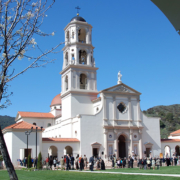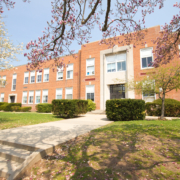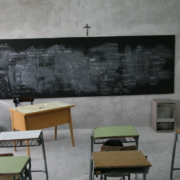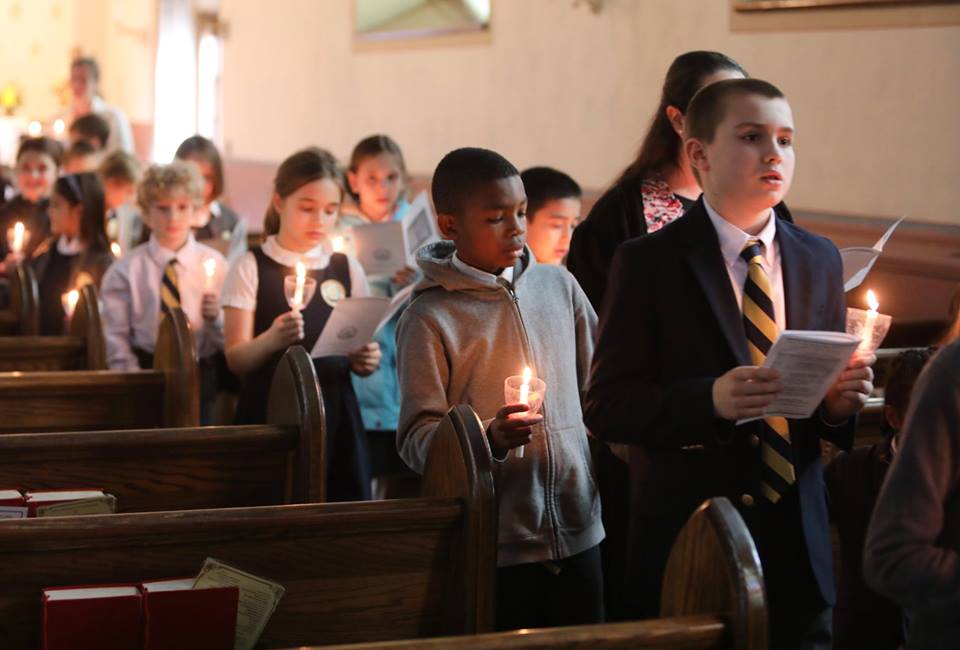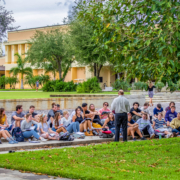Protecting Your Right to Educate: How Catholic Education Can Defend Against Emerging Legal Threats
Editor’s Note: The article below is included in the forthcoming spring 2021 edition of the Newman Society’s Our Catholic Mission magazine.
Half a century into a sexual revolution that has upturned notions of sexual morality and even gender identity, Catholic education is under attack like never before. Religious schools and colleges are facing protests, lawsuits and other serious threats—all because Catholic educators hold fast to Church teachings that were considered common sense even a decade ago.
Catholic schools and colleges have not sought out and do not want this confrontation. They exist to form young people to serve and worship God and to spread love and hope to others, rooted in the Church’s teaching on the dignity of the human person and God’s design for human sexuality. But educators are finding that, due to forces beyond their control, their freedom to operate according to conscience and mission is shrinking.
No option for compromise
As legal and cultural pressures continue to swell, Catholic school leaders must decide now how they will respond. Many Catholic educators decided a long time ago to assimilate with changes in modern culture. This is a non-starter for schools and colleges that take seriously the mission of authentic Catholic education. Nor is it realistic for Catholic educators to simply hope that this cultural moment will pass them by without incident.
Another option would be to make some compromises with the culture in the hopes of brokering a peace. The pervasive attacks on traditional moral teaching have led some religious leaders to try to compromise and thereby win some good will from gender and sexuality activists. Mormon and Evangelical leaders have tried this approach in recent years, with decidedly mixed results.
In 2015 the Mormon Church threw its weight behind the “Utah Compromise,” an attempt to broker a truce in the culture war by pairing new civil rights protections with religious-liberty protections for faith-based organizations. At the end of 2018, major Evangelical Christian groups—including the Council for Christian Colleges and Universities and the National Association of Evangelicals—endorsed their own version of this compromise approach under the slogan “Fairness for All.” One supporter described the effort to World Magazine in these terms:
As Christian higher educators, we are increasingly persuaded that the most viable political strategy is for comprehensive religious freedom protections to be combined with explicit support for basic human rights for members of the LGBT community.
So far, however, there is little reason to call the “Fairness for All” approach a success. While progressive activists celebrated what they were able to accomplish in Utah, they quickly signaled that it was not enough, and that they would push for more whenever they had the opportunity. Advocates specifically complained that the “Utah Compromise” yielded too much so-called “religious liberty.” The Left has come to see the battle between progressive goals and religious liberty as a zero-sum game, and increasingly decries “religious liberty” as a code word for bigotry. There is little reason for religious conservatives to believe they can change people’s minds on this by compromising on nondiscrimination law.
If compromising principles in order to placate progressive critics is a flawed political strategy, it is perhaps an even worse legal strategy. At one point, the University of Notre Dame told a federal judge that, consistent with Ex corde Ecclesiae, it was prohibited from paying for, providing, or facilitating access to contraceptives. But in 2014, the University reversed course and voluntarily began complying with the HHS Mandate. This sort of inconsistency invites courts to probe as to whether a school’s stated religious convictions are sincere, a key inquiry in religious liberty cases. Perhaps even worse, it encourages protestors and plaintiffs by giving them reason to hope that Catholic institutions will cave if only the heat is turned up hot enough.
Adopt strong Catholic policies
Rather than trying to appease the Church’s critics, Catholic organizations should instead look to clarify and strengthen their religious identity. This is the best way for Catholic schools and colleges to embrace their distinctive mission.
As The Cardinal Newman Society has stressed, the Church calls Catholic educators “to remain vigilant in their mission” by resisting the temptation to conform to the world. Schools and colleges must do this “by preserving a Catholic culture which proclaims essential truths about the nature and dignity of the human person.”
Fortunately, this ecclesial mandate is also a strong and wise legal strategy. While the challenges facing churches and religious organizations are daunting, our nation’s bedrock commitment to religious liberty remains strong. This historical commitment continues to live in the First Amendment’s protections for religious and expressive freedom, broad religious liberty statutes, and specific exemptions found in a number of laws.
Conduct a Mission Audit
In order to best protect their religious liberty, it is imperative that Catholic schools and colleges understand and take full advantage of these protections. To do so, Catholic educators should undertake a Mission Audit to help them understand where they are likely to face challenges and to ensure that they have an architecture in place to protect their freedom to minister and work in accordance with their faith. A Mission Audit also helps schools implement strong Catholic standards, such as those developed by the Newman Society, in every aspect of Catholic education.
Just as a general audit helps an organization understand its financial soundness, a Mission Audit will help a religious organization understand how its religious convictions affect its work and how these convictions may face conflict. The proposed mission audit outlines the kind of practical steps religious institutions can take to avoid such conflicts, improve their ability to claim religious liberty protections, and prepare themselves for potential challenges.
Many school and college leaders see the need to make improvements along these lines but struggle to understand where to begin and what steps they should be taking in the short term. The Mission Audit that I have guided dozens of school, colleges, and other religious institutions through begins with getting leaders around a table to make sure they have clarity about their mission and convictions. Building on this consensus, leaders should ask some high-level questions to get a sense about what they need in order to accomplish their mission and whether documents and policies adequately convey these requirements. The most important areas to review are employee expectations, student expectations, nondiscrimination statements, and facilities use policies. Schools may also want to make sure they understand the nondiscrimination requirements they are subject to through professional or extracurricular organizations like sports leagues.
In undertaking this overview, school leaders may find it helpful to refer to guides that have been prepared and made available by religious liberty groups. But while publicly available guides and templates can be a good start, most schools and colleges should invest in a more detailed and individualized strategy. Every organization’s circumstances are different, and sophisticated entities should not entrust their legal exposure to an online resource any more than they would forego individualized tax advice.
Each organization’s process will need to take into account the challenges in its locality, as well as the religious liberty provisions specific to the organization type and location. The audit outlined below is a sizable undertaking, but such planning is necessary as a matter of stewardship and prudent leadership. While each such audit must be tailored to the particular entity, every organization’s process should involve three basic steps:
1. Clarify scope and objectives
The first step in the audit process is for school and college leaders, together with legal counsel, to discuss the institution’s general concerns and establish the scope of the audit. Most Mission Audits should address the following subject areas:
Corporate documents
Is the school or college taking advantage of available opportunities to establish its identity as a religious organization under relevant laws?
Public accommodations
Does the school or college have policies and procedures for facility use and rental? If so, does its process properly balance reasons for renting its facilities with its ability to control how the campus is used?
Nondiscrimination policies
Do nondiscrimination policies—in handbooks, policy manuals, and elsewhere—accurately reflect how the school or college makes decisions?
Student conduct issues
Do promotional materials, enrollment process, student handbook, disciplinary process and procedures, etc., appropriately communicate and secure consent regarding the community’s standards and their connection to the religious identity of the school or college?
Employee conduct issues
Does the school or college understand how available religious liberty protections apply to each position? Has it laid the proper groundwork so that it is able to invoke available religious liberty protections when necessary?
Sexual abuse
Do policies and procedures for handling allegations of sexual abuse or misconduct reflect best practices? Is the school or college well-positioned to handle allegations in a manner that balances justice and mercy and that prepares it to address related public relations and legal challenges?
2. Audit policies and procedures
The second stage of the audit involves reviewing how the school or college operates at present. The audit usually begins with a document review and continues with follow-up questions and conversations. A thorough document review typically involves the following: corporate documents; human resources documents; student-related documents; sexual abuse policies and procedures; facility rental policies and procedures; and documents related to third-party obligations, including sports leagues, grants, and government contracts.
3. Develop recommendations
While the first two stages of the audit help a school or college understand where it stands, this final stage is the most important. Here, educators will identify and implement strategies to help them continue to pursue their mission despite the present and emerging threats to religious liberty.
The first goal is to identify obstacles that can be avoided. The school or college could seek to: eliminate unnecessary legal conflicts; eliminate peripheral activities; reduce dependence on government funding; or reduce oversight from licensing or accrediting organizations.
For those conflicts that are not easily avoidable, religious organizations should work to improve their ability to claim crucial protections for religious liberty. By scholar Douglas Laycock’s count, there were 2,000 religious exemptions in state and federal law in 1992. The audit should help educators identify the religious liberty protections most relevant to their activities and identify ways to reshape policies, practices, and documentation in light of these protections.
Finally, the audit recommends ways for the school or college to avoid controversy. While positioning itself to qualify for religious liberty protections, a religious organization should not overlook some simple, practical things it can do to avoid controversy. It should do everything it can to treat employees well and to apply moral standards consistently.
Mission Audits can be conducted with other peer organizations to save on costs and should be done through trusted legal counsel.
Undertaking a Mission Audit—and implementing strong Catholic standards like the Newman Society outlines on the following pages—will go a long way in helping Catholic schools strengthen their mission and defend against legal threats.
Eric Kniffin is legal advisor to The Cardinal Newman Society and a partner with Lewis Roca Rothgerber Christie LLP in Colorado Springs, Colo., where he specializes in protecting religious institutions. This article is adapted from a paper published at the Newman Society’s website. It should not be construed as legal advice or legal opinion on any specific facts or circumstances. The contents are intended for general informational purposes only.


